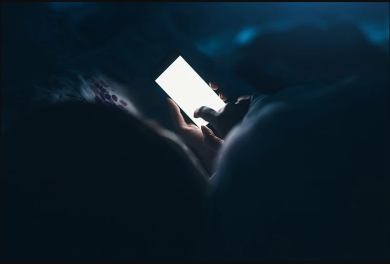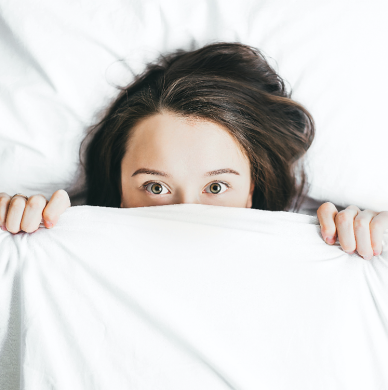The influence of light on your sleep

Lighting is the external factor that most significantly affects sleep. While most people intuitively know that it's easier to sleep when it's dark, the link between light and sleep goes even deeper than that. Discover more today!
Getting the right amount and quality of sleep dictates our health, both in the short and long term. Sleeping well helps:
Getting the right amount and quality of sleep dictates our health, both in the short and long term. Sleeping well helps:
- Repair the brain and body
- Allow muscle recovery
- Combating chronic diseases and conditions
- promote a good mood
Light has a profound effect on our sleep. Exposure to light early in the day stimulates our body and mind, promoting a sense of wakefulness, alertness and the energy needed to start our day. The absence of light sends the message to the body that it is time to rest.
Exposure to light at night stimulates the same alertness as during the day, which can be a serious impediment to healthy, refreshing sleep, making it difficult to fall asleep and promoting frequent and prolonged awakenings during the night. When we are exposed to light at night, our body's circadian rhythm is altered. Consequently, our brain produces less melatonin, which is known as the sleep hormone.
Melatonin helps start the body's physiological preparations for sleep: the muscles begin to relax, the feeling of drowsiness increases, and the body temperature drops. Melatonin levels naturally increase as night falls and continue to rise throughout most of the night, peaking around 3 am. Melatonin levels drop during the early morning and remain low for much of the day. Exposure to light at night inhibits the natural increase in melatonin, which delays the onset of the body's transition to sleep and sleep itself, making it more difficult to get to sleep.
This is especially significant nowadays with the sometimes excessive use of electronic devices such as televisions, smartphones and tablets at night. These devices emit blue light, which in turn is considered one of the greatest melatonin suppressors.
Lack of deep sleep due to light exposure has been associated with the following side effects:
Depression
Sleeping with the lights on has been linked to depression and blue light from our electronic devices is believed to have a bad effect on mood. On the other hand, lack of sleep, as we all know, can also cause moodiness and increased irritability.
Obesity
A study of women found that obesity was more common in those who slept with the television on or with the light on. Studies have shown that the less you sleep, the more food you eat the next day.
Accidents
Not getting enough quality sleep makes us less alert the next day, which can be especially dangerous while driving a car or operating any other type of machine. For older adults, a bad night's sleep can also make them more prone to falls.
Higher risk of chronic diseases
If lighting interferes with your sleep in the long term, you may be at a higher risk of contracting some chronic diseases, including hypertension, heart disease, and type 2 diabetes, etc.
Were you already aware of the influence that lighting has on your sleep?
Exposure to light at night stimulates the same alertness as during the day, which can be a serious impediment to healthy, refreshing sleep, making it difficult to fall asleep and promoting frequent and prolonged awakenings during the night. When we are exposed to light at night, our body's circadian rhythm is altered. Consequently, our brain produces less melatonin, which is known as the sleep hormone.
Melatonin helps start the body's physiological preparations for sleep: the muscles begin to relax, the feeling of drowsiness increases, and the body temperature drops. Melatonin levels naturally increase as night falls and continue to rise throughout most of the night, peaking around 3 am. Melatonin levels drop during the early morning and remain low for much of the day. Exposure to light at night inhibits the natural increase in melatonin, which delays the onset of the body's transition to sleep and sleep itself, making it more difficult to get to sleep.
This is especially significant nowadays with the sometimes excessive use of electronic devices such as televisions, smartphones and tablets at night. These devices emit blue light, which in turn is considered one of the greatest melatonin suppressors.
Lack of deep sleep due to light exposure has been associated with the following side effects:
Depression
Sleeping with the lights on has been linked to depression and blue light from our electronic devices is believed to have a bad effect on mood. On the other hand, lack of sleep, as we all know, can also cause moodiness and increased irritability.
Obesity
A study of women found that obesity was more common in those who slept with the television on or with the light on. Studies have shown that the less you sleep, the more food you eat the next day.
Accidents
Not getting enough quality sleep makes us less alert the next day, which can be especially dangerous while driving a car or operating any other type of machine. For older adults, a bad night's sleep can also make them more prone to falls.
Higher risk of chronic diseases
If lighting interferes with your sleep in the long term, you may be at a higher risk of contracting some chronic diseases, including hypertension, heart disease, and type 2 diabetes, etc.
Were you already aware of the influence that lighting has on your sleep?
